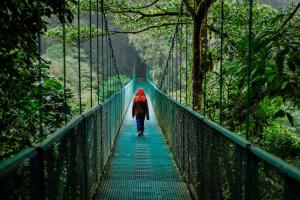Ecotourism Market Set to Hit $829.8 Billion by 2035, Expanding at an 11.7% CAGR
Ecotourism market size was valued at $210.4 billion in 2023, and is projected to reach $829.8 billion by 2035, growing at a CAGR of 11.7% from 2024 to 2035.
Download Sample Report: https://www.alliedmarketresearch.com/request-sample/6729
Ecotourism is a type of sustainable travel that focuses on exploring and preserving natural environments and cultures. It promotes responsible travel practices that minimize negative impacts on the environment and benefit local communities. Ecotourism activities may include wildlife viewing, hiking, and cultural immersion, while also supporting conservation efforts and local economies. The goal of ecotourism is to prioritize environmental and social sustainability, educate travelers, foster appreciation for biodiversity, and contribute to the protection of ecosystems worldwide.
The growing demand for authentic and immersive travel experiences is a significant ecotourism market opportunities for growth. Modern travelers increasingly seek meaningful interactions with local cultures, environments, and communities, moving away from conventional tourist attractions toward experiences that offer deeper connections and understanding. Ecotourism fulfills this demand by providing opportunities for travelers to engage with nature sustainably and responsibly, fostering a sense of appreciation and respect for the environment.
As travelers become more aware of the impact of their journeys, they seek experiences that align with their values of environmental conservation and cultural authenticity. Ecotourism offers precisely that by promoting activities such as wildlife observation, nature walks, and community-based tourism initiatives. By immersing themselves in these experiences, travelers not only satisfy their desire for authenticity but also contribute to the preservation of natural habitats and support local economies, driving the ecotourism market growth.
The rise in eco-conscious consumer behavior is playing a pivotal role in propelling the ecotourism industry demand. With increasing awareness of environmental issues such as climate change, habitat destruction, and pollution, consumers are seeking travel options that align with their values of sustainability and conservation. Ecotourism emerges as a natural choice for these environmentally-conscious individuals, offering experiences that prioritize the protection of natural habitats and the well-being of local communities.
Eco-conscious consumers actively seek out destinations and activities that minimize their carbon footprint and support conservation efforts. They are willing to invest time and resources into experiences that allow them to connect with nature responsibly while contributing positively to the destinations they visit. As a result, the demand for ecotourism continues to grow, prompting the development of new eco-friendly travel initiatives, accommodations, and tour operators that cater to the preferences of environmentally-aware travelers.
The diversification of ecotourism offerings beyond traditional nature-based activities presents a significant opportunity in the ecotourism market. By expanding beyond wildlife viewing and nature walks, ecotourism providers can attract a broader range of travelers with varying interests and preferences. This diversification allows for the development of innovative experiences that integrate cultural immersion, adventure tourism, and sustainable practices, appealing to a wider audience.
Buy This Research Report: https://www.alliedmarketresearch.com/checkout-final/e8409bf94b5942f28d99fc7dde82c200
Introducing activities such as community-based tourism, culinary tours focusing on local and sustainable food, eco-friendly adventure sports like kayaking or zip-lining, and educational programs on environmental conservation opens up new avenues for engagement. By catering to diverse interests, ecotourism operators can enhance visitor satisfaction, increase repeat visits, and capture market segments that may have previously been untapped. Additionally, this diversification contributes to the overall sustainability of ecotourism destinations by promoting economic growth, supporting local communities, and fostering a deeper appreciation for both natural and cultural heritage.
The ecotourism market is segmented into traveler type, age group, sales channel, and region. Depending on the traveler type, the market is segregated into solo and group. On the basis of age group, it is fragmented into Generation X, Generation Y, and Generation Z. By sales channel, the market is segmented into travel agents and direct. Region wise, it is analyzed across North America (the U.S., Canada, and Mexico), Europe (Germany, UK, France, Italy, Spain, and rest of Europe), Asia-Pacific (China, Japan, India, Australia, Malaysia, Thailand, Indonesia, and Rest of Asia-Pacific), and LAMEA (Saudi Arabia, UAE, Brazil, Argentina, South Africa, and rest of LAMEA).
The key players profiled in this report include Travel Leaders Group, LLC, Aracari Travel, FROSCH International Travel, Inc., Undiscovered Mountains Ltd., Adventure Alternative, Intrepid Group Limited, RICKSHAW TRAVEL GROUP, G Adventures, Steppes Discovery, and Small World Journeys Pty Ltd.
DevLand AI Announces Education Innovation Platform to Support Teachers and Modernize Learning
Louisiana and Yadiel Celebrate Their Wedding at Bonita Ranch, a Flourishing Agritourism Venue in Melbourne, FL
Ace Fire Protection Announces Fire Extinguisher Services for 2025 Regulatory Compliance
Kalendarium
Więcej ważnych informacji
 Jedynka Newserii
Jedynka Newserii

 Jedynka Newserii
Jedynka Newserii

Konsument

Dzięki e-commerce rośnie eksport polskich małych i średnich przedsiębiorców. Wartość ich sprzedaży na Amazon przekracza rocznie 5 mld zł
Mali i średni przedsiębiorcy coraz lepiej radzą sobie na arenie międzynarodowej, choć na razie tylko niecałe 5 proc. z nich sprzedaje swoje produkty za granicę. Duże możliwości ekspansji zagranicznej dają im e-commerce i współpraca z marketplace’ami. Za pośrednictwem Amazon w 2024 roku polskie MŚP sprzedały produkty za ponad 5,1 mld zł. Model sprzedaży sklepu umożliwia przedsiębiorcom z Polski działanie na skalę, która jeszcze kilka lat temu wydawała się zarezerwowana głównie dla największych marek
Polityka
Większość Polaków sprzeciwia się wprowadzeniu euro. Problemem może być brak dobrej komunikacji

– Polska należy do siedmiu krajów UE, które do tej pory nie wprowadziły jeszcze euro. Choć zobowiązaliśmy się do przyjęcia wspólnej waluty w traktacie akcesyjnym, nigdy nie podjęliśmy konsekwentnych działań w tym kierunku – ocenia europosłanka Nowej Lewicy Joanna Scheuring-Wielgus. W dodatku tylko co czwarty Polak jest zwolennikiem zmiany waluty. Również obecna sytuacja gospodarcza – wysoka inflacja i rosnący deficyt – nie sprzyjają dyskusji o przyjęciu euro.
Handel
Źle wprowadzony system ROP może oznaczać duży wzrost cen dla konsumentów. Podrożeć mogą produkty spożywcze

Ministerstwo Klimatu i Środowiska proponuje powierzenie NFOŚiGW zadań organizacji odpowiedzialności producenta, która w imieniu producentów będzie realizowała obowiązki wynikające z ROP w ramach zamkniętego obiegu finansowego. Przedstawiciele Polskiej Federacji Producentów Żywności i sektora odzysku odpadów ostrzegają, że może utrudnić to Polsce wypełnienie unijnych wymogów w zakresie selektywnej zbiórki odpadów, a co za tym idzie, może się wiązać z karami, a w konsekwencji – ze wzrostem cen.
Partner serwisu
Szkolenia

Akademia Newserii
Akademia Newserii to projekt, w ramach którego najlepsi polscy dziennikarze biznesowi, giełdowi oraz lifestylowi, a także szkoleniowcy z wieloletnim doświadczeniem dzielą się swoją wiedzą nt. pracy z mediami.









.gif)

 |
| |
| |
|